In Bearbeitung (Info: markusschiesser@hotmail.com, 079-2825468)
Blood for the gods (Yiji 2016)
Dokumentarfilm: Markus Schiesser, China, 122 Min.
(Pumi mit englischen Untertiteln)


The Anji/Hangui is a ritual specialist among the Pumi (Premi) people who live in southwestern China. He works in the same field as the Lama monk of Tibetan Buddhism, which is the dominant tradition in the region. This film shows three Anjis, their daily life and their rituals in a remote mountain village of Muli county, Sichuan province. It highlights how Anjis today navigate pressures from the state and Buddhist authorities while attending to the demands of their rich world of gods, spirits, demons, the ghosts of the dead and, of course, the local people themselves.
In the centre of an Anji’s culture are the scriptures that detail the rituals and chants. Many of these scriptures were burned during the Cultural Revolution (1966-1976), but some Anji families managed to hide them in remote mountain caves. These books are all the more crucial today as they assist the current generation of Anjis to continue an interrupted tradition. Occasionally, the information derived from these books is seen to fill the gaps left by their fathers, who were not allowed to study the rituals.
The Anjis refer to these scriptures when they defend the need for blood sacrifices against the objections of both Buddhist and state authorities. They explain that it is only the Anjis who can deal with the most powerful spirits, and those all need to be fed with blood and meat in order to peacefully co-exist with, or even become helpful to, human beings. Inevitably, some of the Anjis have given in to the pressure and gave up blood sacrifices. While these Anjis acknowledge that according to the scriptures blood sacrifices are needed, they reject them in accordance with the state authorities as ‘feudal superstition’.
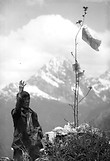
Abu: Healing- and Death-Ritual (Muli 2004)
Dokumentation: Markus Schiesser, China, 93 Min. (Pumi)
Gami Zhongga (Abu) vom Pumi Dorf Siweng war in ganz jungen Jahren Leibwächter des 'Königs von Muli' gewesen. Später wurde er Dorfoberhaupt von Siweng, obwohl er in einem tibetischen Dorf aufgewachsen war und in das Haus seiner Frau eingeheiratet hatte. Ich traf ihn das erste Mal 1996 in Siweng, damals gab es weder eine Strasse noch TV und nur selbst produzierten Strom. Die Männer waren oft noch mit alten Flinten unterwegs. Abu adoptierte mich in die Familie und nahm mich 2x mit auf die 'Reise der Seele'. Wir alle müssen zu Lebzeiten mindestens einmal den Weg zu den Gongga Bergen abgeschritten haben, damit die Seele sich nach dem Tod nicht auf dem Weg dorthin verirrt. Als Abu mit 75 Jahren krank wurde, rief die Familie den jungen Arzt, der eine kleine Klinik in der Region betreibt. Er führte die Krankheit auf einen übermässigen und lebenslangen Genuss von schlecht gebranntem, billigem Schnaps zurück. Die Familie zog aber auch den lokalen Anji-Priester bei. Der diagnostizierte den Verlust der Seele, die von einer verstorbenen Nachbarin und ehemaligen Geliebten Abus gestohlen worden war. Trotz aller Bemühungen und einem Ritual zur Rückführung der Seele starb Abu bald darauf mit 76 Jahren. Im Film sehen wir dieses Ritual. Nach Abus Tod wird sein 'Mani Dongbu' gebaut und mit den 'lebenswichtigen' Dingen gefüllt, die die Seele für die letzte Reise zu den Gongga-Bergen braucht. Das letzte Ritual ist das Abschiednehmen und Loslassen der Seele. Nicht dabei war ich für die Wasserbestattung, wo der Leichnam in weisse Tücher gehüllt dem Fluss übergeben wurde.

Free Downlaod
Yun Yinsen: Lotus Qigong (Shanghai 2019)
Markus Schiesser: Lehrvideo, China, 51 Min.
(Chinesisch mit englischen Untertiteln)

Yun Yinsen 恽银森, geb. 1933, unterrichtet in Shanghai Liuhebafa, das stark von seinem Yiquan geprägt ist. Seine wichtigsten Lehrer waren Liang Qizhong 梁启忠, Zhang Changxin 张长信 (1902-1990) und Han Xingqiao 韩星樵. Weil Yun Yinsen nur wenig am Kampfaspekt seiner Kunst interessiert ist, hat ihn Zhang Changxin in das Lotus Daoyin eingeweiht. Auf diesem Video unterrichtet er die einzelnen Übungen Schritt für Schritt, erzählt auch von seinem eigenen Weg und dem Training mit den Meistern einer Generation, die damals vor allem an möglichst effizieter Kampfkunst interessiert waren. Zum Material gehört auch ein kurzer Ausschnitt von meinem Treffen mit Liang Qizhong und ein Interview mit Zhang Xiaoyuan, dem Sohn von Zhang Changxin.
Yang Shaogeng: Basic Yiquan (Shanghai 2005)
Markus Schiesser: Video mit Yang Shaogeng, China, 52 Min.
(Chinesisch mit englischen Untertiteln)
Yang Shaogeng (1922-2007) begann 1941 mit dem Yiquan Training und war ein direkter Schüler von Wang Xiangzhai. Ich hatte das Glück, ihn in seinen letzten Lebensjahren in Luoyang kennenzulernen und er hat mir erlaubt, ihn bei einer sehr durchdachten und detaillierten Einführung in die Grundlagen des Yiquan zu filmen. Zum ursprünglich geplanten 2. Teil ist es leider nicht mehr gekommen. Yang Shaogeng zeigt die verschiedenen Aspekte seines Yiquan mit seinem Schüler Shi Nuo in Shanghai. Es gibt kein Filmmaterial und nur wenige Fotos von Wang Xiangzhai. Nur schon deshalb ist alles Material von der 2. Generation Yiquan wichtig und Wert, es sehr genau zu studieren. Einmalig an diesem Video ist es, dass Yang Shaogeng konkret und detailliert auf einzeln Aspekte des Yiquan eingeht. Er ist auch Autor von 意拳诠释 (Erklärungen zum Yiquan).
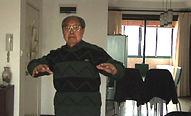
Cai Songfang: Wuji Qigong (Shanghai 2005)
Markus Schiesser: Interview, China, 42 Min. (Chinese)
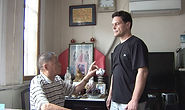
Free Downlaod
Das Wuji-Qigong ist wohl das kondensierteste Übungssystem und besteht im Wesentlichen aus einer einfachen Standmeditation. Daoistischen Ursprungs und lange nur im Verborgenen weitergegeben, ist es Teil des ursprünglichen Yang-Taijiquans. Yang Chengfu hat es an Ye Dami weitergegeben, dessen Schüler Jin Renlin unterrichtete Cai Songfang. Er hat dieses Qigong an die Öffentlichkeit gebracht, weiterentwickelt und mehr als 20 Jahre in Kliniken in Guangzhou, Südchina unterrichtet. Cai Songfang ist stark vom Chan-Buddhismus beeinflusst. (Siehe auch Bücher von Jan Diepersloot)
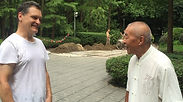
Yun Yinsen: Liuhebafa (Shanghai 2018) (2 Videos)
Markus Schiesser, China, (Chinesisch):
1. Interview, 51 Min.
2. Übersicht über sein System, 53 Min.
Yun Yinsen redet über Liuhebafa und Yiquan, seine Lehrer und wie es damals war in Shanghai Kampfkunst zu lernen. Im zweiten Video gibt er einen Überblick über sein System, zeigt und kommentiert die Übungen. Zuletzt zeigt er die Form mit 66 Bewegungen und gibt dabei die Namen der Bewegungen an.
Shamanic healing through the generations (Hainan 2019)
Markus Schiesser (mit Iphone): Ritualdokumentation, China, 54 Min.
(Hainan Dialekt)


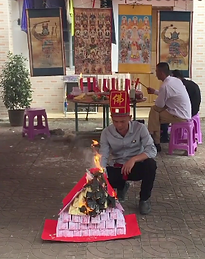
Some things didn’t work well over the past year. That’s why the family of the Li ethnic group invited a local priest with his crew, including a female medium, for the New Year Festival. In such cases, the problem is often a discontent of the ancestors. The necessary ritual involves the men of the clan communicating with the male ancestors. The women are usually left out of ritual activities. It takes place in the house, courtyard, and by the grave, while daily activities continue. Only when the ancestors are satisfied, can the problems dissolve. There needs to be an interactions between every men and the ancestors to find out the root of the problem. Special stones have to be thrown until the ancestors guide them into the right position to show their agreement with a certain question. This process can take a long time. Another part of the ritual is about dissolving a damaging spell implemented with the spreading of snake blood around the house by some unfriendly forces. In this case and after a long time dealing on spot with very real worldly family affairs, it turned out, that a grand-grand uncle, who never was married (and therefore had no offspring) complained that nobody takes care of him and his grave. He is simply forgotten. It was the female medium who talked in strange tongues and used harsh words to scold the family on his behalf. The priest translated and pointed out the mistakes clearly. Even the skeptics in the family were getting pale while listening. But at the end of the ritual, everybody was relieved. To show that the family is again protected by the ancestors, all members had to walk barefooted through a pile of smoldering coal.
In the process of the ritual family issues, past and present, came to light and were discussed passionately. Learning later that in a younger generation of the grand-grand uncle in question, there was an aunt taken away by Japanese soldiers during the Japanese occupation of Hainan between 1939 and 1945. She was imprisoned as a rape slave and never came back. The question remains how the local people deal with such unbearable memories and the tragedies of these women.


